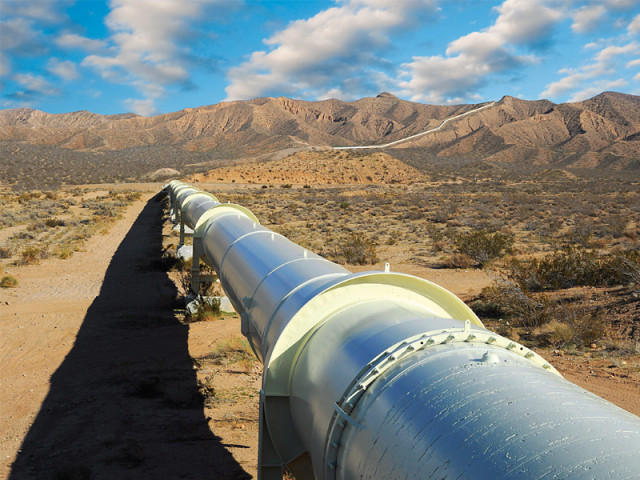Energy matters: SDPI advises govt to nix Iran gas project
Report says the gas sold to Pakistan would be much more expensive than domestic gas.

File photo of a gas pipeline. PHOTO: FILE
A Pakistani advocacy group has said the plan to import natural gas by pipeline from Iran will be an economic ‘death sentence’ for the country, the Associated Press and Kyodo reported on Thursday.
Citing a report released by the Islamabad-based Sustainable Development Policy Institute (SDPI) on Wednesday, the reports state that under the deal struck with Iran, the gas sold to Pakistan would likely be several times more expensive than domestic gas.
SDPI experts recommended the government renegotiate the natural gas import price with Iran under the Iran-Pakistan gas pipeline project due for commissioning by the end of next year.
“It is imperative for Pakistan to renegotiate the import price of natural gas at earliest,” Arshad Abbasi, who heads the energy team at SDPI said.
The gas purchase agreement links the gas price from Iran to the ‘Japan Crude Cocktail’ which is determined by the price of crude oil when cleared by Japan Customs.

But Abbasi said that formula does not take into consideration the global trend of delinking gas prices from oil prices.
“In Asia, Japan has already asked Qatar to consider a pricing mechanism different from oil-linked contracts,” Abbasi said. “The energy landscape has transformed and gas prices have fallen during 2007 to 2011 in all gas hubs. In the current scenario, the liquefied natural gas import price after incurring the shipping and re-gasification cost for 2012 show that the price of the pipeline’s gas might be even costlier than LNG import prices,” Abbasi said.
SDPI President Shafqat Kakakhel said the report’s purpose was not to find fault with those who negotiated the gas prices, but he added the skills of the Pakistani negotiators “were not up to the mark.”
A member of the study team said that by linking the gas price with the Japan Crude Cocktail, the Pakistani negotiators had inflated prices by $2 per barrel. He said the price should have been linked to the import price of crude oil at the factory gate in Pakistan.
Published in The Express Tribune, October 25th, 2013.



















COMMENTS
Comments are moderated and generally will be posted if they are on-topic and not abusive.
For more information, please see our Comments FAQ